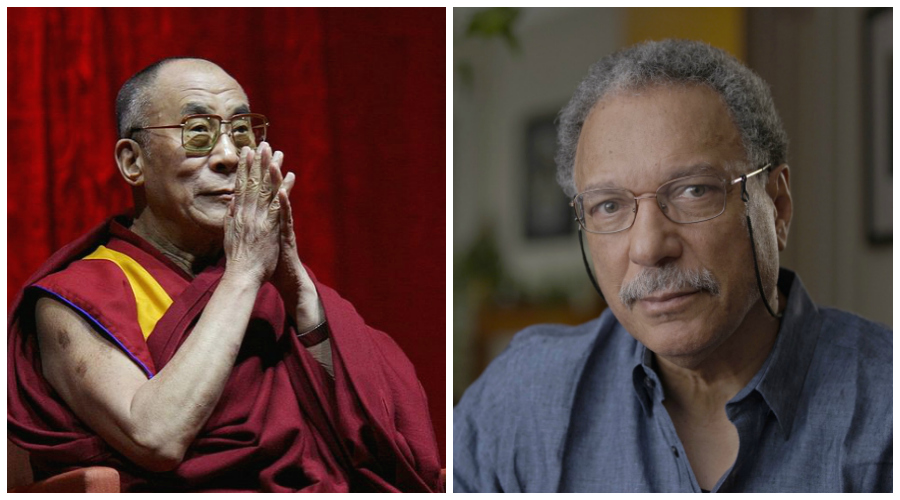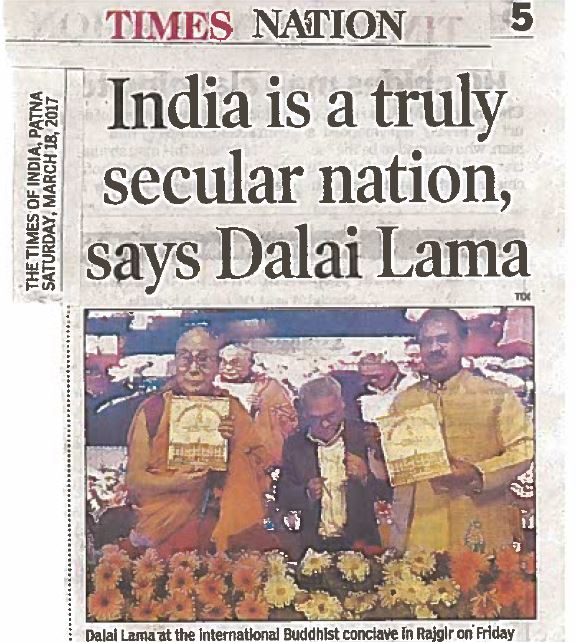Text by Daniel Pauly
On March 17, I met the Dalai Lama for a brief moment, following a long keynote speech he gave at a conference on ‘Buddhism in the 21st Century’, held in Lalanda, in the Indian State of Bihar.
It was not that I had suddenly given up on my freedom from religion. Rather, when I was invited to participate in this conference – along with a few western scientists involved in environmental conservation and animal welfare – I did not find any good reason why I should not accept, given that Buddhism appears to be the rare faith that does not require you to check your knowledge of physics, biology and history, as well common sense at the door.
And indeed, the Dalai Llama’s speech, sometimes interrupted by giggles (he giggles a lot), was about the need for Buddhists to love each other, across their own divisions, to love people of other faith, or none (a nice touch), and especially to embrace secularism (see attached newspaper account) and modern science, and give less attention to holy books – the Buddhist ones included.
I cannot tell what the audience made of this. About one-third consisted of Buddhist monks from Asia –including quite a few females – and other continents, the rest being, I guess, lay Buddhists.
Although the conference was chaotically organized, it will probably achieve its goal of establishing the basis for a consensus among the various Buddhist ‘traditions’ (Tibet, Thailand, Vietnam, Sri Lanka, etc.) on how to respond to the ethical challenges posed by climate change, biodiversity losses and the global cancer of an inequitable economic system that we are saddled with, and which is driving us into an environmental catastrophe.
And yes, I presented what we do to the biodiversity of the oceans in a breakout session that also included Buddhist monks, one of which dragged the audience through an account of how Gautama Buddha loved trees and other plants…
While the trip to the conference site had been uneventful (direct 14h flight from Vancouver to Delhi, then a short flight to Patna, Bihar’s capital, followed by a three-hour bus ride to Lalanda, a city near an ancient site of Buddhist learning), the return trip to Patna confronted me with the reality that escapes one when hopping from one conference to the next.
Some trucks had caused an accident-induced traffic jam (Bihar’s roads appear to have far more old, dilapidated trucks than anything else, bicycles included), and my quick-witted driver left the highway for a back road just in time before our car could be squeezed between more trucks. The harrowing back roads we then took went through numerous squalid villages of the State of Bihar, one of the poorest in India, where big landowners rule over millions of poor farmers, who have only religion (Hinduism, with its ubiquitous cows and castes) to transcend their misery – which it doesn’t.
Also prominent in the Bihari landscape were monumental ruins of abandoned infrastructure development projects (half-constructed bridges, segments of incomplete pipelines, un-erected electric pylons, etc.) which I recognized from the Philippines as the concrete achievements of corrupt politicians.
I was as shaken when we finally made it to the airport in Patna as I was when I visited India for the first time in the 1980s. In Delhi, before returning to Vancouver (via London this time) I then met an old colleague and friend, Michael Vakily, whom I had previously visited in the Philippine countryside, in Sierra Leone and in Thailand, where he ran various field projects for the research center we both worked for. The four-year, German-funded project in India that he now works for is meant to create biodiversity reserves, including marine protected areas. However, it took three years to get the clearances required for the project to officially start…
On the other hand, he had a brilliant Indian PhD as a counterpart, who was enthusiastic and who seemed to know precisely what ought to be done to protect India’s biodiversity. He is India as well. I wonder which India will prevail.



